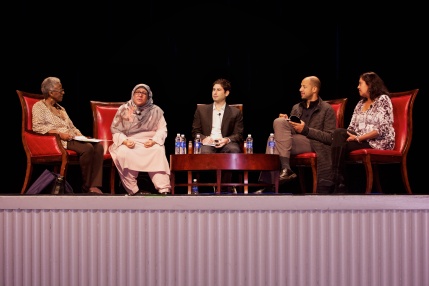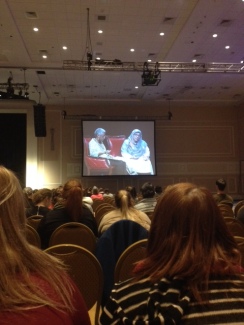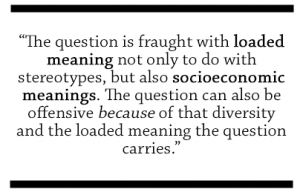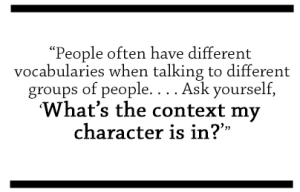This November I attended the NCTE (National Council of Teachers of English) Annual Convention in Washington, DC and was overwhelmed by the broad focus on diversity in children’s books. Though many of us have been aware of this issue for years (or even decades) it is often a topic set aside for one or two poorly-attended panels located at inconvenient times in back rooms.
Not this year.
This year, NCTE dedicated part of the conference’s Opening Session to the topic. In front of over a thousand people, a panel of authors including Rukhsana Khan, Christopher Myers, Matt de la Peña, and Mitali Perkins spoke about their experiences with diversity—and the lack thereof—in children’s book publishing. Expert Rudine Sims Bishop moderated the panel.
Panels on this topic, even those with heavy-hitters like the people mentioned above, rarely receive this kind of audience or placement. As part of the Opening Session, the panel set the tone for the whole conference, and made a major statement: we will not ignore this problem. Kudos to NCTE for making that statement, and to all of us for creating an environment this year in which such a statement was possible. Below, we have asked Rukhsana Khan to share her comments from the panel:

NCTE Opening Session Panel, from L to R: Rudine Sims Bishop, Rukhsana Khan, Matt de la Peña, Christopher Myers, Mitali Perkins (image provided by NCTE)
Rukhsana Khan: When I was a young girl, growing up in a small Judeo-Christian town, a friend of mine told me this joke. I don’t mean to offend anyone and in fact, I myself found it racist, but I tell it here to make a point:
Once there was a Catholic who lived in a farmhouse.
On a cold stormy night there came a knock at the door. It was a man.
He said, “Please sir, could I have shelter? I’m half frozen and very hungry.”
The owner of the farmhouse said, “Are you Catholic?”
The man said, “Yes.”
“Oh! Come on in and rest yourself there by the fire!”
A little while later another knock came at the door.
It was another man, half frozen, asking for shelter.
The owner said, “Are you Catholic?”
The man said, “Yes.”
“Oh! Come on in and rest yourself there by the fire!”
A little while later another knock came.
It was another man, half frozen.
“Are you Catholic?”
“No, I’m Protestant.”
The owner said, “Oh. Well there’s some room there on the porch. Maybe if you press yourself against the window you can get some warmth from the fire.”
Now, make no mistake. I found this joke to be very offensive, but I didn’t say anything. But to myself, I thought, “Wow. If this is how one Christian talks about another Christian, what the hell do they think of me?”
And ever since then I’ve always felt like I was out there on the porch, looking in, to a warm scene of people gathered around a fire, but the warmth doesn’t penetrate the glass of the window.
Growing up in such a community, I used books to survive.
The books I feasted on were from the library. I didn’t know you could purchase books! As immigrants we had enough problems just keeping food on the table, so there was never money for books!
And I remember reading one of the Anne of Green Gables books, one of the later ones, Anne of the Island or something and I got to a point where L. M. Montgomery refers to ‘those heathen Muhammadans,’and I couldn’t believe it!

Rukhsana speaks with Rudine Sims Bishop
She was talking about me!
Couldn’t she ever have imagined that one of those ‘heathen Muhammadans’ would one day be reading one of her Anne books and identifying so much with the characters, thinking that aunt was just like so and so, and that uncle was just like this uncle of hers???
I got so mad I threw the book across the room.
And once more I felt like I was out on the porch, looking in.
We need diverse books! But what really constitutes diversity?
These days there’s an awful lot of books that pass as diverse literature, that are written by white feminists, who mean well, but I wonder how well they can really penetrate the cultural paradigms of the ethnicities they write about.
I mean how can someone from inside the cabin really comprehend what it’s like to be out there on the porch, when they’re sheltered and warm from the fire?
And think about it. When you’re in a well-lit house, looking out onto a dark porch, the windows act as mirrors. You can’t properly see outside! It’s your own world that’s reflected back at you.
And as a result many of these books just come down to plunking a white kid in an exotic setting and writing the story as they would react to it!
What kind of diversity is that?
We can’t just color the kid in the story brown or what-have-you and maintain western ways of thinking. Kids need to be exposed not to just characters of another color but also different cultural thinking and ways of problem solving.
We need to be less superficial.
Because ultimately, how can we ask children to think outside the box when they’re living so firmly within it?
 Rukhsana Khan is the author of several award-winning books published in the United States and Canada including, most recently, King for a Day. Born in Lahore, Pakistan, she and her family immigrated to Canada when she was three. Khan’s stories enable children of all backgrounds to connect with cultures of Eastern origins. Khan lives with her husband and family in Toronto, Canada.
Rukhsana Khan is the author of several award-winning books published in the United States and Canada including, most recently, King for a Day. Born in Lahore, Pakistan, she and her family immigrated to Canada when she was three. Khan’s stories enable children of all backgrounds to connect with cultures of Eastern origins. Khan lives with her husband and family in Toronto, Canada.
Filed under:
Diversity 102,
Educator Resources,
Fairs/Conventions Tagged:
NCTE,
Rukhsana Khan,
writing cross-culturally 

 Stacy Whitman is Editorial Director and Publisher of Tu Books, an imprint of LEE & LOW BOOKS that publishes diverse science fiction and fantasy for middle grade and young adult readers. This blog post was originally posted at her blog, Stacy Whitman’s Grimoire.
Stacy Whitman is Editorial Director and Publisher of Tu Books, an imprint of LEE & LOW BOOKS that publishes diverse science fiction and fantasy for middle grade and young adult readers. This blog post was originally posted at her blog, Stacy Whitman’s Grimoire.
I recently got this question from a writer, who agreed that answering it on the blog would be useful:
My hero is a fifteen-year-old African American boy [in a science fiction story]. A few of my alpha readers (not all) have said that he doesn’t sound “black enough.” I purposely made him an Air Force brat who has lived in several different countries to avoid having to use cliche hood-terminology. I want him to be universal.
Do you have thoughts on this either way?
Is there a possibility that my potential readers could really be offended that a) I am “a white girl writing a book about black people” and b) that my character doesn’t sound black enough? I’ve looked through your blog and website and haven’t found anything specific to my needs on this particular question. Perhaps I missed it?
…should I use Ebonics or not use Ebonics?
First of all, black people—just as white people or Latino people—are a very diverse group of people. There are people who speak in Ebonics (which I believe would be more accurately referred to as BVE–Black Vernacular English) and people who speak plain old suburban English, people who speak with any of a variety of Southern accents and people who have Chicago accents, people who speak with French or Spanish accents (or who speak French or Spanish or an African language). So the question of whether a particular character in a particular situation sounds “black enough” is a complicated question, one that even the African American community can’t necessarily agree on. Within the community (and I say this because I asked a coworker who is African American, who can speak with more authority on the subject than I can) it’s often a question that draws on complicated factors, such as money, privilege, “selling out,” skin tone (relative darkness or lightness—literally, being “black enough”), and hair texture, which all relate to how much a part of which community a person might be.
The question, then, is fraught with loaded meaning not only to do with stereotypes, but also socioeconomic meanings. The question can also tend to be offensive because of that diversity and the loaded meaning the question carries.
Which leads me to the question of your alpha readers. What are their demographics? Is it a diverse group? What is their experience with the military? Is more than one of them African American? When writing cross-culturally, you’ll want to be sure that your beta readers include sufficient numbers of the member of the group you’re writing about. Every individual experience will be different—one person’s opinion on whether a character reads as African American will proba bly differ from another person’s, especially if their socioeconomic background and regional experiences are different. An African American from the St. Louis suburbs will have a different life experience than someone who grew up on a farm in Louisiana, whose experiences will probably be different from a kid who grew up in Harlem or someone else who grew up in Seattle.
bly differ from another person’s, especially if their socioeconomic background and regional experiences are different. An African American from the St. Louis suburbs will have a different life experience than someone who grew up on a farm in Louisiana, whose experiences will probably be different from a kid who grew up in Harlem or someone else who grew up in Seattle.
If your local writing group isn’t very diverse, you might need to branch out for beta readers who you can rely on to comment on that particular element of your story—perhaps through an online writing group, perhaps through the SCBWI. You might even approach a local high school and ask if any of their students who come from a similar background to your character might be willing to give you feedback on your manuscript. Do you have connections with a local Air Force base? Perhaps you might network with people you know in the military to find someone who can give you feedback on that aspect of the character building.
To answer your other questions: it’s always possible that someone will be offended by a white person writing about a person of color, but generally, most readers I’ve talked to who care about diversity in fantasy and science fiction want that diversity to come from everyone, not just writers of color. This is why I emphasized alpha readers—it’s important to make sure that if you’re not from that background, you do your research (which it sounds like you have) and then run it past someone other than yourself who understands that culture or background (in this case, you’ve got two cultures going on: African American and military, particularly Air Force, which has a completely different culture than Army).
A few someones is even better, to ensure that you get different points of view and can mesh that feedback into something that works for your particular character, who will be an individual in his own right and not a representative of a group that plays into a stereotype.
Which leads into your next question: should you use Ebonics? And the answer to that is: I don’t know. Do African Americans in the military use Ebonics? Do only some of them, and does it depend on their family history/region of origin? Do their kids speak to each other in Ebonics? Or do they have their own way of speaking that’s particular to the Air Force community? (My uncle was in the Air Force and I have a couple cousins who might read this who may be able to answer that question; they’ve never spoken anything but “Midwestern” to me, but they might have spoken differently to their friends who were also Air Force brats.)
next question: should you use Ebonics? And the answer to that is: I don’t know. Do African Americans in the military use Ebonics? Do only some of them, and does it depend on their family history/region of origin? Do their kids speak to each other in Ebonics? Or do they have their own way of speaking that’s particular to the Air Force community? (My uncle was in the Air Force and I have a couple cousins who might read this who may be able to answer that question; they’ve never spoken anything but “Midwestern” to me, but they might have spoken differently to their friends who were also Air Force brats.)
And that’s important too: people often have different vocabularies when talking to different groups of people. When my roommates from Georgia talked to their family, their accents became stronger. When I talk to my rural family, the word “crik” has been known to creep back into my lexicon. So ask yourself, “what’s the context my character is in?” as well.
And of course, that’s just me spouting off from the point of view of an editor. Here are some great answers we’ve gotten from readers:
Ari:
The question about Ebonics is just…. I don’t know. Being “black enough” does not mean you use Ebonics so that shoudln’t be the deciding factor. However, my guess is that as a “military brat” he wouldn’t use Ebonics. I know some African American people who were in the army and they don’t use it. But that’s the army, not the Air Force, so it could be different.
I would be offended if your black character never talked about certain issues we face like the subtle racisim, especially as a black guy. But since’s science fiction it may never come up, although if it starts out in the 21st century in America then the character should acknowledge the fact that he gets looks of suspicion in certain areas because he is an African American guy…
That is so true about how people speak differently wiith different groups of people. When my mother is back home down South, she regains her Southern accent. My father speaks Spanish with his relatives. I use a lot more slang/Ebonics with my African American friends and Latino friends. So that is a key factor. Something an African American person has to learn to do is be able to “speak two languages” in a way. Around white people and authority figures, most of us speak properly, no slang. But I know from what I’ve done myself and from what I’ve seen my parents and their friends do, when African Americans are just with each other, they loosen up and their is less of a concern for “speaking properly”
Cleve:
I’m an African American dad & writer, and my advice to the writer is to skip the ebonics. Not every African American speaks with ebonics, and I fear it may come off as condescending and offensive if you attempt to tell your story in such a way. “Not black enough,” is offensive as hell, wether voiced by black or white people. The character is African American, there’s nothing wrong with him sounding like an American. Period.
Doret:
I believe all writers can create believable characters of another race. But to do this writers must be familiar that race.
Should I use Ebonics or not use Ebonics? – that question makes me cringe. A White author asking this should really take a look at their character and ask themselves, what do I know that will give life to this character of another race.
If they still want to do it, research. Listen in on conversations. Read books by Black authors. Ask around find out which non Black authors have created believable Black characters and read those , also read the Black characters by non Black authors people found unrealistic.
AudryT:
IMO, your character needs to speak based on their influences, not on readers’ opinions of the world. Where do their parents come from? How do individuals from their parents’ backgrounds, childhood neighborhoods, and social class speak? How does that influence your character? Does your character have an opinion about how their parents speak and do they make conscious decisions about their own way of talking? How can you use the character’s voice and upbringing to flesh out the character better and further serve the plot of the novel?
Readers, feel free to chime in and help out writers who write cross-culturally: what other issues should they be aware of when writing African American characters?
Further reading: 10 Great Resources for Writing Cross-Culturally
Filed under:
Publishing 101,
Resources Tagged:
African American,
aspiring authors,
author advice,
diversity issues,
Notes from the Editors,
Science Fiction/Fantasy,
Tu Books,
writing advice,
writing cross-culturally 

As we’ve discussed on here before, diversity in children’s and YA books can be pretty controversial. Just reading the comments sections at any of the latest posts about diversity can make your head spin, between the people denying that white privilege exists and those saying that even if it does exist, it doesn’t matter, because “people of color don’t read.”
Those things aren’t true, but how do we dispel them? How do we address the multi-pronged issue of getting more diverse books out there?
The CBC Diversity Committee is working to help address this. This week on the CBC Diversity blog, the theme is “It’s Complicated.” Check out Nancy Mercado’s opening post:
The internet can often be a rough-and-tumble kind of place when it comes to complex and layered discussions, but we think it’s possible and necessary to have a respectful and open forum where we are able to chat about some of the challenges that we face, as well as the opportunities that exist when we come together as a community.
This will be a safe space for us in publishing—writers, editors, marketing folks, sales people, artists, anyone involved in getting books to kids—to discuss the issues.
Today, Cynthia Leitich Smith is talking about the fear of saying something wrong. Hop on over and join in on the conversation.
———————–
On a related note, here’s some recent coverage of this issue.
The Atlantic Wire: The Ongoing Problem of Race in YA
Huffington Post: Race On YA Covers: Survey Reports A Continued Lack Of Diversity
Jezebel: White Folks Star in 90% of 2011′s Young Adult Book Covers
John Scalzi: Straight White Male: The Lowest Difficulty Setting There Is
John Scalzi: “Lowest Difficulty Setting” Follow-Up
Sarah Ockler: Race in YA Lit: Wake Up and Smell the Coffee-Colored Skin, YA Authors [at SFWA]
Sarah Ockler: Race in YA Lit: Wake Up and Smell the Coffee-Colored Skin, YA Authors [at her own blog]
Originally published at Stacy Whitman's Grimoire. You can comment here or there.
It has been more than a month since my computer worked well on a regular basis, and most of that time I was without a computer at home at all. It still isn’t working well–there are days when it will take 15 minutes just to type a paragraph—but at least it kind of works… ish. Dell sucks, is all I’ll say, and I promise never to buy anything else from them as long as I live.
At any rate, sorry for being out of touch, particularly those who were waiting for the handout from LTUE. If that was you, can you comment here so I can send it to you? Just be sure to put your email in the comment form, and I’ll be able to contact you.
Originally published at Stacy Whitman's Grimoire. You can comment here or there.

 Rukhsana Khan is the author of several award-winning books published in the United States and Canada including, most recently, King for a Day. Born in Lahore, Pakistan, she and her family immigrated to Canada when she was three. Khan’s stories enable children of all backgrounds to connect with cultures of Eastern origins. Khan lives with her husband and family in Toronto, Canada.
Rukhsana Khan is the author of several award-winning books published in the United States and Canada including, most recently, King for a Day. Born in Lahore, Pakistan, she and her family immigrated to Canada when she was three. Khan’s stories enable children of all backgrounds to connect with cultures of Eastern origins. Khan lives with her husband and family in Toronto, Canada. 




 bly differ from another person’s, especially if their socioeconomic background and regional experiences are different. An African American from the St. Louis suburbs will have a different life experience than someone who grew up on a farm in Louisiana, whose experiences will probably be different from a kid who grew up in Harlem or someone else who grew up in Seattle.
bly differ from another person’s, especially if their socioeconomic background and regional experiences are different. An African American from the St. Louis suburbs will have a different life experience than someone who grew up on a farm in Louisiana, whose experiences will probably be different from a kid who grew up in Harlem or someone else who grew up in Seattle.
Keep on writing, Rukhsana! You are one of the important voices for today’s children.
[…] children’s author Rukhsana Khan’s words about achieving diversity at NCTE. She wrote up her talk for the Lee & Low […]